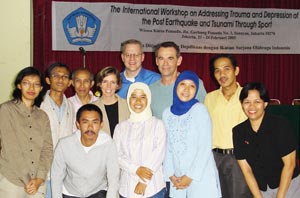|
Campus News
UAlbany Professor Addresses Mental Health Needs of Tsunami Survivors
By Carol Olechowski (March 10,
2005)
 |
|
Eric Hardiman (back center) with design team
|
In the aftermath of the tsunami that devastated southeast Asia, the world rushed money, food, shelter and other humanitarian aid to the region. Now, relief efforts are also beginning to address mental health needs of survivors, and UAlbany faculty are assisting those efforts.
School of Social Welfare faculty member Eric Hardiman recently traveled to Jakarta to conduct a workshop aimed at providing Indonesian professionals with "some background in trauma and traumatic stress, grief and loss, and the potential role of sport and physical activity."
Joining Hardiman in designing and delivering the intensive four-day program - The International Workshop on Addressing Trauma and Depression Through Sport - were Dawn Anderson-Butcher of Ohio State and Tom Martinek of the University of North Carolina-Greensboro. Their training materials included resources adapted from the National Center for Child Traumatic Stress and the National Center for Post-Traumatic Stress Disorder. Support for travel and the workshop was provided by each school, in partnership with the Indonesian government.
The workshop was the idea of Hardiman's UAlbany colleague Hal Lawson, who notes that "there's a severe shortage in Indonesia of mental health professionals and social workers." Lawson is a professor of social welfare who has experience and contacts in Indonesia.
Through the workshop, says Hardiman, "We emphasized the natural coping strategies and strengths that people and communities have, and used our training to help the Indonesians think about ways to support the affected areas via development strategies that strengthen natural community coping and build long-term capacity for supports." The workshop, held in February, drew on the presenters' expertise in social work and sports.
Hardiman, Martinek, and Anderson-Butcher used a "train the trainers" approach to maximize the scope and impact of the training throughout Indonesia. Many of the 50 participants, who represented various universities and non-governmental organizations, "will actually go to Aceh [in northernmost Sumatra] and help organize support systems," notes Hardiman. "Others will remain in their own geographic areas, but will be involved in training support workers."
Workshop participants split into six design teams, each charged with developing "a comprehensive set of strategies to deliver support services emphasizing sport and physical activity," says Hardiman. "Examples included soccer, volleyball, dance, and walking through such activities as after-school programs, youth clubs, and exercise classes. These activities will help Acehnese youth regain a sense of normalcy and engage in positive, healthy activities, and help promote individual and social responsibility and leadership skills, while bringing communities together in positive ways."
"In addition to being used by the Indonesian ministries of Sport and Social Affairs to structure support delivery systems, the strategies will be used by the individual participants in their own training efforts. The possibility for reaching large numbers of Indonesian people with the ideas from our training is nothing short of remarkable," explains Hardiman, whose work at UAlbany focuses on self-help, mutual aid, and mental health services.
During the workshop, he says, "we learned a great deal of Bahasa, the primary language of Indonesia, and the Indonesians improved their English too." The trainers also confronted "the multiple and complex cultural differences" among Indonesians themselves.
The Indonesians, Hardiman says, "taught us immense amounts about their history, culture and traditions, society, religion, worldviews, and the impact of the losses following the earthquake and tsunami. We found ways to bridge language and cultural barriers, and ultimately learned to look beyond differences for the common bonds holding us together."
According to Lawson, "the Indonesian officials are already proposing a follow-up intervention because they were so pleased with the work Eric and his colleagues did. We anticipate that all three will be invited back."
|
